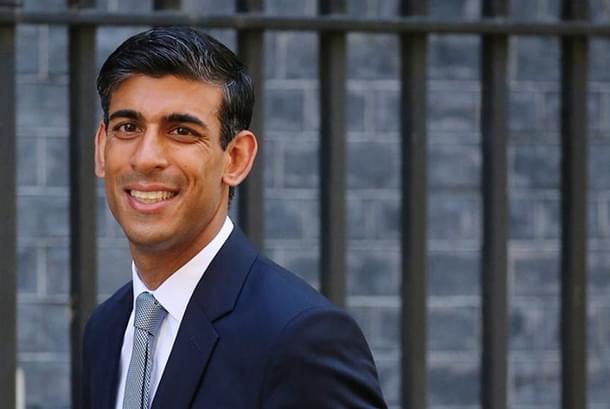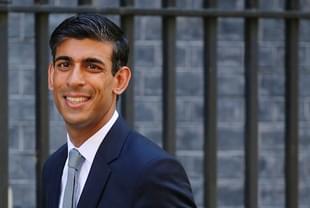Insta
UK Chancellor Rishi Sunak Unveils A Massive $459 Billion Stimulus, Govt To Pay 80% Of Monthly Wages Up To £2500/Worker
Swarajya Staff
Mar 21, 2020, 04:34 PM | Updated 04:34 PM IST
Save & read from anywhere!
Bookmark stories for easy access on any device or the Swarajya app.


The U.K. government on Friday (Mar 20) unveiled an unprecedented stimulus plan to confront the potentially catastrophic economic fallout from coronavirus pandemic.
The government announced several sweeping measures including paying lion’s share of wage bills as long as companies do not fire workers.
The stimulus, announced by Prime Minister Boris Johnson and newly appointed Treasury chief Rishi Sunak, was hailed as a swift response that will help support workers’ incomes given that measures to spread the containment of coronavirus pandemic is likely to shut down major part of British business.
The chancellor announced the following measures
- The Government will pay 80% of the salary of employees not working. The coronavirus job retention scheme will pay up to £2,500 per worker each month to businesses. The move is expected to conservatively estimated to cost the exchequer $11.6 billion.
- Businesses will be able to get interest-free loans for 12 months through the coronavirus business interruption scheme. The loans will be available from Monday (Mar 23).
- No business will pay any VAT from now until the end of June that will add up to a 30 billion-pound tax holiday.
- The Universal Credit standard allowance will be increased by £1,000-a-year for the next 12 months. The working tax credit basic element will be raised by the same amount.
- Self-employed workers can access Universal Credit at a rate equivalent to statutory sick pay for employees.
- Increasing the generosity of housing benefit and Universal Credit, so that the Local Housing Allowance will cover at least 30% of market rents
The UK government had already announced a series of steep including interest-rate cuts and large-scale asset purchases by the Bank of England.
Along with the latest steps, the total cost of the economic stimulus is estimated to be $459 billion, or around 16% of the country’s annual national income.
Last week, US Treasury Secretary Steve Mnuchin announced that President Donald Trump is considering sending checks to Americans as part of a $1 trillion economic stimulus package aimed at helping households and businesses reeling under the impact of the sudden economic slowdown triggered by the coronavirus pandemic.
Under the $1 trillion economic stimulus, as much as $500 billion is likely to be earmarked for direct cash payments across two tranches of $250 billion each, the first of which government hopes to deliver as early as end of April. The package also includes roughly $50 billion in assistance for the airline industry, which has been hit hard by the pandemic, and up to $500 billion to support small businesses.





